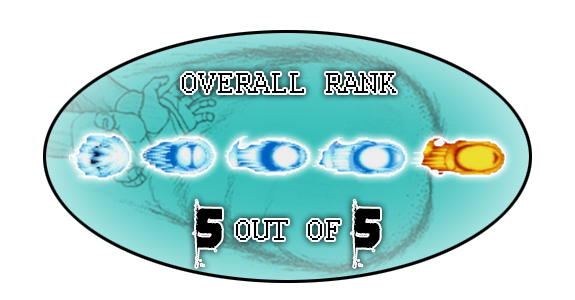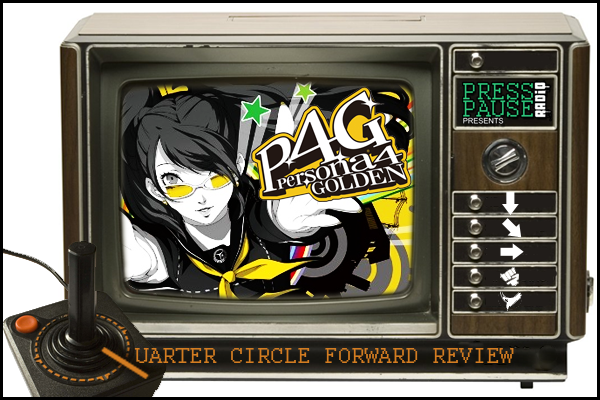
The PS Vita is under attack for seemingly being a dumping ground for half-baked ideas, cheap ports and abyssmal console-to-handheld migrations that run the gamut from mediocre to horrendous. Despite this, there are still many standout titles. But now the Vita has its Excalibur, a game so large and deep that it and it alone can squeeze enough playtime out of Sony's floundering handheld to make it worth the $250.00 purchase. Seriously.
While it may be a port of a PS2 game from 2008 (making it not only from the last console generation but also from the last decade,) it's a game that holds so much clout that any argument against its origins and previous hardware are null aand void. In fact, I named its source material “Game of the Decade” in a previous show on Press Pause Radio for a very good reason. And that game... is Persona 4 Golden.
An exemplary specimen, Persona 4 Golden specimen shows how the JRPG still delivers an experience trancendant of its increasingly-irrelevant -- and dying -- genre, despite having all of the mainstays we've seen for decades: battle sequences, dungeons, level and money-grinding, and a teenage cast and a quest to save the world. It's all here. It's what was added to all of this that makes this quite literally the best of its kind, even though its direct predecessor, Persona 3, pioneered most of the ideas and mechanics you'll find here. How can that be? Can it really stack up? And what's this game all about, anyways?
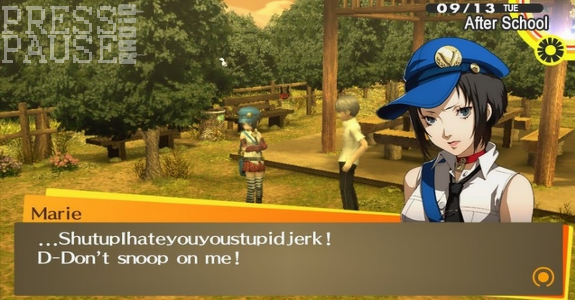
Between dreams and reality sits a special room inhabited by denizens of another dimension. There they wait until a fated individual -- you -- makes his or her way into thier chamber; The Velvet Room. Of course there's a very real reason for your arrival.
In the sleepy rural town of Inaba, a bizarre mystery is unfolding: rumor has it that if you gaze into a turned-off TV at Midnight on a rainy night, you'll see the Midnight Channel... and your soulmate.
Meanwhile, people are turning up dead, dangling from power lines and TV antennae. And it just so happens that all of this starts going down just as the main protagonist (who, as always, I named Ser, 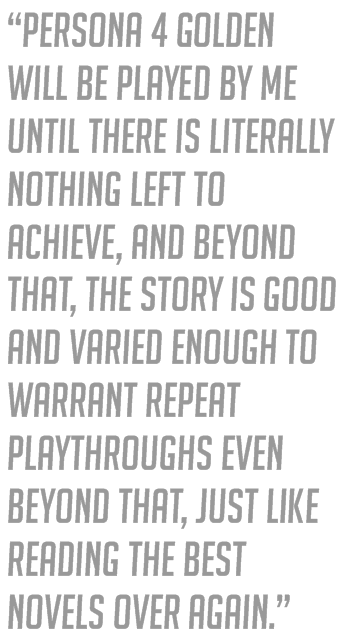 despite the cheesy-punned name given to him in this year's Persona 4 Arena) has arrived to stay with his uncle while his parents are overseas on business for a year. And that's all you're getting! Play the game if you want to know more!
despite the cheesy-punned name given to him in this year's Persona 4 Arena) has arrived to stay with his uncle while his parents are overseas on business for a year. And that's all you're getting! Play the game if you want to know more!
Progression takes place throughout a series of themed dungeons filled with enemies known as shadows which can be seen in the rooms and corridors of each area. In terms of enemy encounters, Persona 4 Golden allows for players to make thier way around thier opposition if they choose to avoid the fight, but they can also strike first to avoid being taken by surprise. If you can nail a shadow from behind, the player gains the advantage and can lead off with some devatating attacks.
But that's just the tip of the iceburg. Every character and nearly every enemy in the game has a weakness of some kind. Whether it's fire, ice, physical attacks and so-forth. If the weakness of the target gets hit, you'll knock them down and get an extra attack. If an enemy is hit the same way a second time, dizzyness is inflicted and you can continue to wail on them. However, if you can knock over all of the enemies in a battle using the “1-more” system, you can activate an all-out rush with your teammates and deal some pretty intense damage to the opposition. Every character you control in the game has his or her own persona and Tarot arcana. However, since the main character is “The Fool”, he can have multiple personas, and the amount of personas he can carry varies with level. This is where the second major system of Persona 4 kicks in.
From the get-go, you start to meet people with whom you'll create so-called “Social Links” with. Certain choices you make in terms of your actions and what you say in response to questions, comments and conversations will speed these links along, which will help in the progression of the game.
The Social Links play a couple of different roles; first off, when fusing new personas, if you have a Social Link formed with a corresponding Arcana, you'll get bonus experience straight off the bat allowing for your newly created other self to get massive bonuses and new abilities much faster than if a Link has not been established. Likewise, if you have a corresponding Arcana when working on a social link, you can become closer to that person faster, allowing for a faster maximum link which allows for new persona fusion to be unlocked or even team-mate persona evolution!
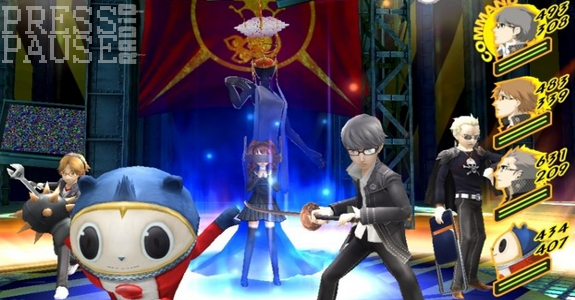
Some social links require other stats to be higher than others. In five key areas, you can enhance your character to be able to handle certain social situations better, thus accessing new links. And while you can't get do all of the social links in a single playthrough – it is literally impossible – the New Game Plus option will retain all of your personality enhancements, allowing for you to say, for example, really gutsy things from the game's outset that you may not have had the courage to say before.
Believe it or not, all of that is just Persona 4 in a nutshell. Persona 4 Golden takes things even further. Strengthening social links with teammates, for example, will also increase stats and unlock new abilities for thier personas, there are new attacks in battle that have been added that will surely surprise even the most seasoned Persona 4 vets. The numerous additonal and alternate story pieces within the main plot make the game very fresh overall as well. And of course there are the new Social links. There's even new weather that affects various in-game mechanics.
On the presentation side, new music keeps things sounding fresh, and new character art, models and super sharp environments make Inaba look better than ever before. While fans of the original Persona 4 release may lament the loss of some key voice actors and actresses (Chie sounds vastly different,) the VO is still just as expertly delivered as ever, and very natural to listen to.
There's even some Passive Online play in Persona 4 Golden. When making decisions or deciding what to do next, you can tune into other players that have made choices at that point to see what the popular choices were. You can also pull a Demon's Souls and send out an SOS if you run into trouble in a dungeon. It adds a very cool twist to the already awesome Persona 4 formula, and lends to the feeling - especially in the dungeons - that people are watching you on the Midnight Channel.
An then there are the extras. New Game Plus is back, as stated before, but there is also a brand new set of Television “shows” that are unlocked as the game progresses that include persona commercials, music concerts, new OST entries, side-story info and even a Persona 4 quiz show. Add to all of that new Trophy support and man, does this little game card have an awful freaking lot to it!
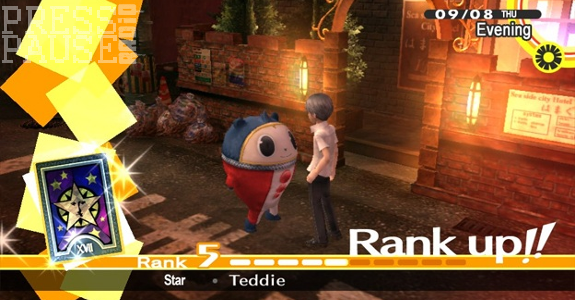
Persona 4 was the best JRPG – heck, RPG in general – that I've ever played. As a 100 hour experience, repeat plays can be a bit on the long side, but totally worth it with the new game plus option. The only reason I didn't go back sooner (and I did start over again immediately after beating it the first time around!) was the announcement of the new Vita version. Persona 4 Golden will be played by me until there is literally nothing left to achieve, and beyond that, the story is good and varied enough to warrant repeat playthroughs, just like reading the best novels over again. It's worth buying a Vita for. It's worth playing for 500 hours. And it's worth getting at the $39.99 price point whether physically or via download over the Playstation Network. Get it, get it, get it.
